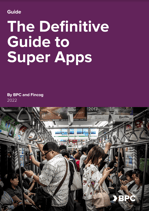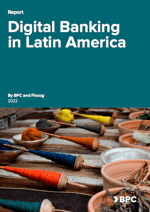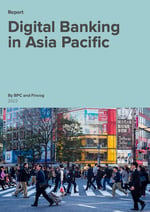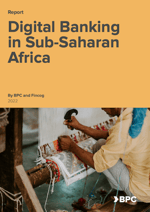BPC offered visitors a true ecosystem experience through interactive digital screens. And BPC launched its long awaited smart city survey: Digital Goes Urban – providing insights into the problems that smart cities solve for their citizens.
Around 5,000 people joined to attend keynotes, have fireside chats or exchange intelligence whilst enjoying food from all corners of the world. We talked, ate, and learned a lot. Here are our key lessons from the event.
 BPC’s – quite literally – outstanding and eye-catching booth.
BPC’s – quite literally – outstanding and eye-catching booth.
Key learnings
1. From point solutions to platform based operations
One major trend we observed is that we’re moving away from point solutions to more platform based operations. Flourishing operations are developing into ecosystems. During an expert interview about ecosystems within the payments industry with Peter Theunis, BPC’s Managing Director Europe, the conclusion was that the time of isolated solutions are over. Experience and seamlessly integrated end to end journeys are what it’s all about. The right answer today is no longer "we'll build it for you". It is "we'll deliver". Whether it is BPC on its own or with partners, it is about having the right expertise and bringing the right parties together.
2. Payments are still not frictionless
Which are the most important challenges for banks to secure they are future proof? Another BPC panel discussion, featuring Evgenia Loginova, Global Commercial Officer at BPC, Megan Caywood, Global Head of Digital Strategy at Barclays, and Scott Johnson, Head of Product at Western Union, underlined how important it is that payments are frictionless and efficient, as people do not want to dwell on cumbersome processes.
3. Data allows for more tailored offerings
The discussion also talked about how data allows for increasingly tailored and personal payment solutions. When using data to customize payment offerings however the thin line between invasive services and infringement on people’s personal space needs to me closely monitored.
4. The opportunities and risks of emerging markets
One of the discussion points that stood out from the discussion around banks and eyeing the future, are the opportunities and risks embedded in emerging markets. Although emerging markets have made great technological strides, there are still many risks involved. Transparency remains a bottleneck and technology is still an enabler, making it difficult for investors to manage risk.
5. Financial institutions are no longer looking for suppliers. They want partnerships
One topic that kept on coming back during the event is the importance of setting up stable partnerships in different markets and in different capabilities. Strong partnerships allow (fintech) platforms to up their game and advance towards ecosystems. Strong partnerships prevent people from being spread too thinly and have too many things happening at once. Strong partnerships lay the cradle for a more sustainable environment so fintechs can keep up with the speed of change. Strong partnerships allow players to excel at core capabilities.
6. Fintech has become mature: execution is where it’s at
Fintech has matured. It’s no longer talk the talk and discuss solutions to problems nobody has. Execution is where it’s at. And banks are catching up. There used to be a huge gap between what was (technically) possible and what was eventually offered to clients. Challengers have raised the bar and set the expectations of consumers, while regulators are encouraging competition and innovation. This forces banks to rise to the occasion and find the right partners. Most of them are establishing these partnerships in the fintech space, now that this field has matured.
7. The importance of access to open data
In the past, many industries operated in silos. In the banking, transport, insurance and government sector, companies would mostly act as separate entities, regarding one another as a form of competition, rather than as a force of reinforcement. But these days are over. In all different industries cross contamination is happening. Entities are increasingly joining forces and exchanging insights, allowing one plus one to equal three. To allow for this cross-pollination to succeed and stitch opportunities together there is one prerequisite: access to open data.
To summarize: Money20/20 confirmed BPC’s vision that the future of fintech and banking lies in an ecosystem structure, where banks, governments, fintechs, clients, partners, and other (financial) institutions partner up to collaborate and allow for acceleration.





 BPC’s – quite literally – outstanding and eye-catching booth.
BPC’s – quite literally – outstanding and eye-catching booth.